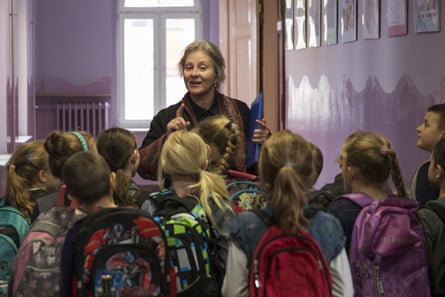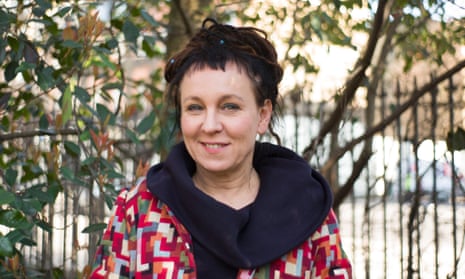When Olga Tokarczuk’s sixth novel, Flights, was about to be published in the UK last year the Bookseller trilled that “she is probably one of the greatest living writers you have never heard of”. The trade weekly, speaking specifically to a UK readership, can be forgiven for making such a bald assertion – even though she has had two previous novels translated into English – since it is only now that Flights has been shortlisted for the Man Booker international prize that Tokarczuk has begun to command the sort of attention in the English-speaking world that her home fans would consider her due. She has long been one of Poland’s highest profile writers – a vegetarian feminist in an increasingly reactionary, patriarchal country, and a public intellectual whose every utterance can make news headlines.
Flights combines (among other things) the observations of a fretful modern traveller with the story of a wandering Slavic sect, a biography of a 17th-century Flemish anatomist and an account of the posthumous journey of Chopin’s heart from Paris, where the Polish composer died, to his desired resting place in Warsaw.
I meet Tokarczuk before an interview at the British Library by the critic Adam Mars-Jones, who wrote a highly complimentary review of Flights in the London Review of Books. “It could almost be an inventory of the ways narrative can serve a writer short of, and beyond, telling a story,” he said. “The book’s prose is a lucid medium in which narrative crystals grow to an ideal size, independent structures not disturbing the balance of the whole.”
Tokarczuk prefers an astronomical metaphor, explaining that, just as the ancients looked at stars in the sky and found ways to group them and then to relate them to the shapes of creatures or figures, so what she calls her “constellation novels” throw stories, essays and sketches into orbit, allowing the reader’s imagination to form them into meaningful shapes.
Our previous meeting was a year earlier in a Warsaw cafe, when Flights had yet to be published in the UK. The vagaries of English translation meant we were there to discuss a novel that was originally published in 2007. She is currently best known in Poland for a 900-page historical epic called The Books of Jacob published in 2014 (and due out in English next year).
Set on the border between modern-day Ukraine and Poland, The Books of Jacob tells the story of Jakub Frank, a Jewish-born religious leader who led the forcible conversion of fellow Jews to Catholicism in the 18th century. The novel itself was well received, selling 170,000 copies in hardback and winning her a second Nike award, known as “the Polish Booker”. But in a television interview after the award Tokarczuk outraged rightwing patriots by saying that, contrary to its self-image as a plucky survivor of oppression, Poland itself had committed “horrendous acts” of colonisation at times in its history. She was branded a “targowiczanin” – an ancient term for traitor – and her publisher had to hire bodyguards for a while to protect her. “I was very naive. I thought we’d be able to discuss the dark areas in our history,” she said.
Days later she sailed into another controversy, when a film of her 2009 novel Drive Your Plow Over the Bones of the Dead – titled Pokot (Spoor) – was premiered at the Berlin film festival. Scripted by Tokarczuk in collaboration with director Agnieszka Holland, it was denounced by a Polish news agency as “a deeply anti-Christian [work] that promoted eco-terrorism”. It went on to take Berlin’s prestigious Silver Bear, and, at a joint press conference, the duo were jubilant. “We are thinking of putting it on the promotional posters,” joked Holland, “because it will encourage people who might otherwise not have bothered to come and see it.”

Readers who have come to Tokarczuk’s work through Flights are likely to be disorientated by Drive Your Plow, which will be published in English this autumn. It is a strongly voiced existential thriller, in which an elderly eccentric living in a remote village finds her quiet life overturned as first a neighbour, then a police chief and a local bigwig are found battered to death.
She wrote the novel between Flights and The Books of Jacob and her explanation is disarming, involving a two-book deal and a handy fashion for detective stories. “But just writing a book to know who is the killer is wasting paper and time, so I decided to put into it animal rights and a story of dissenting citizens who realise that the law is immoral and see how far can they can go with saying no to it.”
Hunting has become a hot political issue in Poland since the novel was published, but at the time few were thinking about it. “Some people said that once again Tokarczuk is an old crazy woman doing weird things, but then this big discussion started on the internet about what we can do about this very patriarchal, Catholic tradition.”
Characteristically of this magpie writer, the title is stolen from William Blake’s revolutionary manifesto The Marriage of Heaven and Hell. Not only is each chapter prefaced with lines of Blake’s poetry, but the protagonist has befriended a young translator whose attempt to render the poet into Polish at one point creates five different versions of a single stanza, causing a severe headache for Tokarczuk’s own translator, Antonia Lloyd-Jones (American Jennifer Croft is responsible for Flights). One might almost suspect Tokarczuk of making fun when she gave her character the line: “Right at the start, a dispute arose over whether we should translate the English word ‘mental’ as mentalny – ‘mental’ in the literal sense, ‘of the mind’ – or duchowy – more like ‘spiritual’.”
Like her protagonist, Tokarczuk and her partner Grzegorz Zegadło – a translator specialising in German – live in rural Lower Silesia, a southern region of Poland that only became part of the country after the second world war. “I’m lucky to have such an empty piece of land to describe because in Polish literature there are no legends or fairytales about it,” she says.
It is “a very special place” with a Tuscan micro-climate, which became a sacred space for members of the “68 generation” – hippies and artists, not to mention several translators of Blake, who had discovered the poet in the false dawn of the late 60s, along with the music of the Doors and the Animals.
Tokarczuk was six years old, and living in the small town of Sulechów, when the student protests of 1968 erupted. Her father’s family were refugees from a part of Poland that is now in Ukraine. Both parents were teachers who “lived in an island of leftwing intellectuals, but not communists”, and whose book-lined house filled their daughter’s head with the possibility of becoming an author.
Instead, a “romantic notion of helping people” took her to Warsaw University, where she studied psychology and developed a fascination with the work of Carl Jung, which remains a cornerstone of her writing. After graduating she took a hospital job as a specialist in addiction, married a fellow psychologist and gave birth to a son. But after five years, she decided she was too fragile to continue at the hospital. “I was working with one of my patients and realised I was much more disturbed than he was.”
She left her job and published a collection of poetry, quickly followed by a novel, The Journey of the People of the Book – a parable set in 17th-century France – which won a prize for best debut. Though the books, and the prizes, kept rolling in, in her mid‑30s Tokarczuk hit a crisis and decided she needed to take some time out to travel, wandering from Taiwan to New Zealand on her own, and taking her young son off to Malaysia one particularly cold Polish winter. With her trademark dreadlocks she looks as though she left part of her heart on the hippie trail, though – as she has explained with a characteristically informal scholarliness – her hairstyle is actually a plica polonica, or “Polish tangle”, reports of which date back to the 17th century. “In a certain sense we can be proud to have introduced this hairstyle to Europe,” she said. “Plica polonica should be added to the list of our inventions, alongside crude oil, pierogi and vodka.”
Today, she combines writing with co-hosting a boutique literary festival near her home. Though widely published throughout Europe, her books are only slowly emerging in the anglophone world. House of Day, House of Night (1998/2003), introduced her “constellation” style in a patchwork of stories, lists and essays a set in her home village across a wide historical timescale, while Primeval and Other Times chronicled the lives of the inhabitants of a fictitious settlement over 80 years from 1914, from the point of view of the four archangels appointed to guard it. Published in 1996, it was only translated in 2009.
The literature of central Europe is very different from that of the west, she explains. “The first thing is that we don’t trust reality as much as you do. Reading English novels I always adore the ability to write without fear about inner psychological things that are so delicate. In such a form you can develop a story in a very linear way, but we don’t have this patience. We feel that in every moment something must be wrong because our own story wasn’t linear. Another difference is that you are rooted in psychoanalysis while we’re still thinking in a mythical, religious way.”
There’s a pause, as she zooms out to a wider historical focus: “If your country is wiped off the map and your language is banned, if your literature has to serve a cause, it becomes, however brilliant, rather hard to travel.” Or, seen from the other side, as it is so brilliantly and sardonically in Flights: “Barbarians don’t travel. They simply go to destinations or conduct raids.”

Comments (…)
Sign in or create your Guardian account to join the discussion